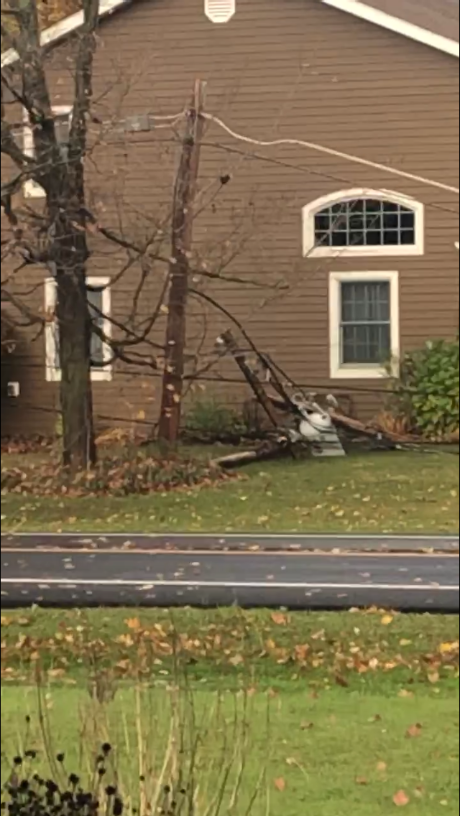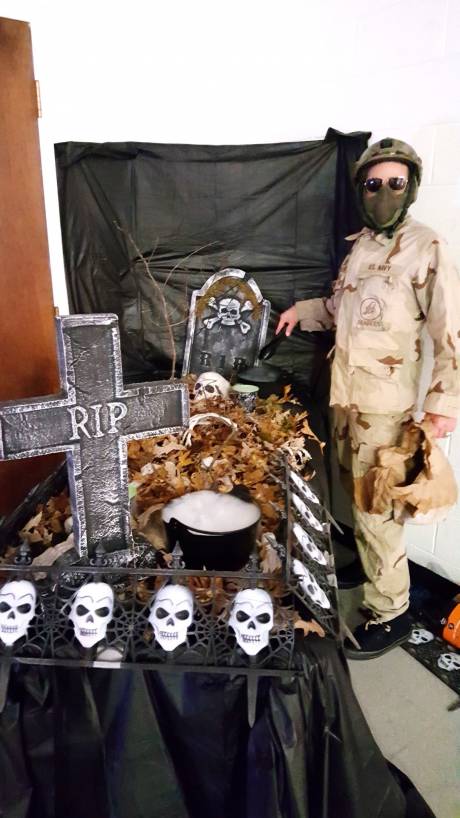Residents of the City of Batavia will select a new full-time City Court judge in the Nov. 5 General Election. The candidates are Durin Rogers and Ben Bonarigio. We sent each candidate a series of questions about their views of the law. We are publishing their written answers verbatim. Here are the answers from Ben Bonarigo.
Among the current members of the U.S. Supreme Court, which justice do you admire the most and why?
Of the current members of the U.S. Supreme Court, I identify with and admire Justice Ruth Bader Ginsberg the most. Justice Ginsberg was raised in a working-class family in a rented apartment in Brooklyn, N.Y. She was a voracious reader and spent a good deal of her early years in the public library. She attended and graduated from public schools. Tragedy struck when her mother died from cancer a week before Ruth graduated from high school.
Earning a full scholarship to Cornell University, the seeds of legal activism and gender equality were planted. She believed very firmly in the idea, and correctly so, that women should be, in all respects, treated equally as men were under the law. This ideal was “firmed up” in her years at Harvard and Columbia Law where she graduated with her law degree at the top of her class. She left Harvard after the Dean asked her (along with her 8 other female classmates) why they were taking up the class seats of men at Harvard Law School. She transferred to Columbia Law School the next year.
After graduation, she became a law school professor and strenuously pursued significant gender-based discrimination cases. Many of those cases she successfully argued before the Supreme Court. After a stint on the U.S. Court of Appeals for the District of Columbia which commenced in 1980, she was appointed, and confirmed in 1993, to become the second female to ever sit as a Justice on the U.S. Supreme Court.
Justice Ginsberg has distinguished herself as a Justice who faced gender discrimination at almost every step of her education and legal career. She used that discrimination to fuel her desire to help women who, like her, were being improperly discriminated against in this country. Although I don’t always agree with where she comes down on her legal opinions, I have the utmost respect for this diminutive lady who has worked her way to the top bench through some very adverse circumstances. She tenaciously fought legal battles for all women to reach equality. She also fought hard for inequalities of other types in her illustrious career before becoming a judge.
She is living proof, and a beacon for all, to show how hard work, a thirst for knowledge, having a passion for what one believes and intense perseverance can propel them to the apex of their chosen field.
Do you view the Constitution as a living document or would you define yourself more as a strict constructionist, and if neither of these terms fit your view of the Constitution, how do you view it as a point of Constitutional philosophy?
As a City Court Judge, the issue of constitutional philosophy would rarely, if ever, come up, being more the domain of appellate justices or the Justices of the U.S. Supreme Court. To view the Constitution as a living document is to say that the words on the document evolve over time, and they must be interpreted in light of the changes and adaptations of the people that they govern in the current day. In other words, current-day meaning must be read into the words of the Constitution. When interpreted this way, the words are easily stretched to extend the Constitution to meanings that may never have been intended by the Framers. This occurs as a function of judicial interpretation as opposed to Constitutional amendment or the legislative adoption of a law allowing or prohibiting the conduct described.
The ability to interpret, so as to create law, is the reason that the appointment of federal judges has become such a political hot point in America today. If the justices view the document as a “living document”, it politicizes their appointment because they will sit a lifetime on the bench, potentially creating law for decades. This happens no matter what the political affiliation of appointing powers be at the time. I, for one, am tired of all the political wrangling between the nominating President, and confirming Congress, as it places too much emphasis on politics in what is supposed to be an independent, fair and impartial bench beholden to nothing.
On the other end of the spectrum is the view of the strict constructionist, which is sometimes referred to as the “originalist” perspective. An originalist views the Constitution as a law, giving the law the meaning that its words were understood to mean at the time of its adoption. I wouldn’t interpret the Constitution as a living document nor from an originalist position either. I see myself more in line with the late Antonin Scalia, Supreme Court Justice, who was a self-defined “textualist”. Justice Scalia felt that it was not important to look to the Framers' original intent when they set the Constitution up as our national mission statement but to look to the actual words of the document as being the law. Stated a different way, what the words comprising the Constitution meant when it was adopted are what they mean today, not what we think our founding fathers meant when they chose which words to use.
As time and society’s views on the law and policy change, there is an amendment process built into the Constitution that has been exercised many times throughout history since its original adoption. Therefore, the meaning of the document doesn’t change as a result of our changing society. If there needs to be an amendment, then take the steps to amend it. Admittedly, the steps for the amendment process are burdensome and time-consuming; however, not insurmountable as history dictates.
To view the Constitution in any other way than as a “textualist” renders it meaningless. Why have a Constitution at all if a judge or group of judges can change its meaning because of the way the wind is blowing politically or socially? If a “living document” view is taken, this is accomplished by simply stretching the words of the Constitution to fit the desired result, and if by a strict constructionist this is done to add meaning to the Framer’s intent to find the desired result. I might add here, that a “living document” philosophy is not Liberal, as opposed to Conservative, because given the opportunity to ply the Constitution to fit their needs no matter where they fit on the political spectrum if the opportunity arises it will be seized upon.
Justice Scalia referred to it as a modernist view (a living document) versus the traditional view (textualist) and I for one consider myself traditional. While in taking this view I understand that amending the Constitution is a long, laborious and, at times, a politically charged endeavor. Nevertheless, in construing the Constitution in this manner the hope would be that it would take the judiciary out of creating legislation where it may not ever have been intended. It would leave the act of creating law to the elected legislative branch instead of the appointed judges, and amendment of the Constitution to the citizenry of this great Country.
What three books related to the law have influenced your thinking the most about legal philosophy and why?
- To Kill a Mockingbird by Harper Lee. This novel was written in 1960 and is set in the American Deep South in the Jim Crow era of the 1930s. I read this Pulitzer Prize-winning novel in my first year of college. Atticus Finch is a white lawyer who is assigned to represent a black man, Tom Robinson, who is wrongfully accused of beating and raping a white woman. Sadly, justice doesn’t prevail as the all-white jury convicts Robinson irrespective of his innocence, which was commonplace in this time and place. Moving beyond the racial injustice, this book stands for much more. I was moved by the high moral standards and ethical behavior displayed by Attorney Finch in his representation of Robinson. Finch, after a slow start, but after realizing that Robinson was wrongfully accused, provides him with a stellar legal defense even though it made Finch unpopular in his own community. To me, this is what stands out most in this novel, and which has left an indelible mark on me. The idea that no matter how unpopular the criminal charge or the accused is, that he is entitled to the best defense the lawyer can put forth on behalf of that person. Indeed, during my 37-year career as a trial lawyer, I was asked countless times “how can you represent that person?” I would respond that as a matter of my legal ethics that if I undertake the representation of an accused individual, I must do so zealously and adequately despite how you or others might feel about the cause. Moreover, what if ever lawyer were scared away from representing individuals in difficult cases. What would happen to justice in our courtrooms? More probably, I thought to myself what would Atticus Finch do or say in this circumstance as he became a symbol, albeit fictional, of what equal protection and justice means in American Jurisprudence.
- The Concept of Law by H.L.A. Hart. I read this book as a 1st-year law student and I must admit that it almost scared me away from pursuing a career in law as it so philosophically written. Hart was both a lawyer and a philosopher, and I struggled to find any practical application from it at the time. I thought it important to come to an understanding of what the law was, as I had chosen to embark upon a career in it. I read this book after speaking to one of my Professors. It took me several reads before I came away with what Professor Hart was saying. In this dissertation, Hart defines the difference between rules of law and orders. Orders, refrain people from doing or direct them to do, certain acts with a sanction for non-compliance. Thus, acting as a guarantee that individuals who obey will not be sacrificed to those who do not. Rules empower people to act in certain ways such as to make a will or a contract. Failure to comply with the rules, such as the Statute of Frauds, is to nullify the contract, not sanction the individual. Therefore, rules are normative in nature, molding the way society acts in certain instances. He further distinguished between rules that were “primary” and those that are “secondary”. Primary rules are those that impose duties, such as the Penal Law. Secondary rules are those that give meaning, recognition, empowerment, and enforceability to the Primary rules, such as the Criminal Procedure Law. The uniting of Primary and Secondary rules is what Professor Hart calls the “center” of a legal system. Hart makes us keenly aware that a system of law designed only by fear of coercion will never succeed. It must, in addition, be sensitive to the recognition of authority granted to the system to implement and change the rules as time goes by. Most importantly, it must be based on a sense of moral responsibility because the imposition of laws by the authority (regime as Hart refers to it) that are morally reprehensible are doomed. To me, this illustrates, the sensitive balance that a system of law resides within. When legislatures begin to adopt laws that don’t sit well with the moral public or leave them on the books longer than needed, the fear is that there will be a lack of compliance, which if extended to its logical conclusion, could result in anarchy.
- My Own Words by Mary Hartnett and Wendy Williams. This being a relatively new read (2016), it has inspired me to recently think about how polarized our country has become politically. This is a biography of U.S. Supreme Court Justice, Ruth Bader Ginsberg. I have now walked two laps around the entire City of Batavia on the campaign trail. I have found the majority of people warm and receptive to my knock despite differing political labels and affiliations but, not necessarily political views. In a few instances, that fond reception was not the case, and I was surprised by the curt treatment received. During this walk, considering myself somewhat naïve politically, it became apparent to me very early on how polarized we have become as a people; even at this level. Again, most who reject my candidacy are polite indirectly stating so or did so by politely listening to what I had to say and thanking me for stopping by. It is not those that I take issue with, it is the door slammers and name-callers that trouble me. As a firm believer in our democratic form of government, I recognize that political discourse is the bedrock of our society. I have no problem with that, however, I do have a problem with the nature and tenor of the discourse I heard on my walk. In some instances, it’s fairly clear that political civility has gone out the window on a national level and the reasons why would take up space way beyond that allotted here. Suffice it to say there is blame to go around on all sides in my opinion. It never dawned on me for a moment that this unkind treatment of one person by another based upon political affiliation would filter down to this local level for a judicial race. After all, aren’t judges to be independent thinking and insulated from all outside influences including political view? When I embarked upon this campaign, I truly thought that politics would not play into such a low-level judicial position, believing that was a feature of the loftier state and federal benches, and that votes would be cast based solely upon the candidates’ education, legal experience and commitment to the community. Obviously, for some, (thankfully not all), this is not the way they see this type of election. This race, for some, is a microcosm of what is occurring on the national level and “lines have been drawn in the sand.” Which brings me to Justice Ginsberg’s biography. She probably could not be any further away on the political spectrum from Justice Scalia, however, her book is replete with praise for the now-deceased Justice. Even though they rarely saw eye to eye on Constitutional interpretation or philosophy, they were steadfast friends off the bench and thoroughly enjoyed each other’s company and discourse. Justice Scalia said in a 2007 interview: “We are two people who are quite different in their core beliefs, but who respect each other’s character and ability. There is nobody else I spend every New Year’s Eve with.” Justices Ginsberg and Scalia were fond of stating: “it is ok to disagree but, it is never ok to be disagreeable.” I said to more than one person I spoke with about our general state of political affairs locally that we shouldn’t try so hard, spending so much time to find differences between us, but instead, we should find what we share in common and celebrate it. The majority of us have chosen to reside in Batavia. Some of us have raised our families here and have worked our entire lives here. Can we be that different from each other? Don’t we have many of the same values and concerns? Don’t we all enjoy the freedoms bestowed upon us by living in the greatest country on earth? I, for one, believe we do, and I want to continue working towards making our terrific city better and safer for us all!!
There is often a lot of debate around the term “activist judges.” What is your view of such debates? Is this a valid topic or a smokescreen? Is it something the public should worry about?
The term “activist judge” is now defined popularly as a judge who uses the irresponsible exercise of judicial authority. The argument goes that if judges are not bound to the words of the Constitution, we no longer have a government of laws, but of judges.
While attempts to define judicial activism have been difficult, one thing holds true: no matter where U.S. Supreme Court Justices have been on the political spectrum, at various times in history, they have selectively used judicial activism to arrive at a desired result in a case. I don’t necessarily agree with this as I am an avowed “textualist”, however, it is a fact of life.
The Warren Court, spanning from 1953 to 1969, has historically been labeled as an activist majority bench. This court decided many cases using judicial activism on a selective basis. Justice Brennan, who shaped many decisions of this era, deferred to the elected branches of government, unless doing so would allow the democratic majority to disregard the interests of an underrepresented group or, when the governing majority was stifling those that opposed it. In those instances, Brennan felt it appropriate to take a more activist view. Those cases resulted in racial integration of schools, invalidating laws prohibiting interracial marriage, prohibition against compelled self-incrimination, and the right of an accused to effective assistance of counsel, among others.
Richard Nixon utilized this judicial activist history as part of his platform for election to the Presidency. In his nomination acceptance speech, he promised that he would appoint “strict constructionists” rather than “judicial activists” to the bench; implying that he was tired of the liberal bias. Surely, over the next several decades the appointments of Justices by Presidents Nixon, Ford, Reagan and Bush put a much more conservative look to the bench.
Nevertheless, this “conservative bent” didn’t change the court's use of selective judicial activism in many cases decided during this era. These included declaring unconstitutional certain affirmative action programs, gun control laws, restrictions on corporate political advertising, among others.
Even judges who were appointed under the guise of exercising judicial restraint (“strict construction”), the opposite of judicial activism, have become activists because in their judicial discretion they have felt it necessary, and the pull was overwhelming. Considering that courts made up of differing political views have used judicial activism at times as a means to an end, how can it be said by either end of the political spectrum that it is always inappropriate?
Therefore, there is a negative connotation attached to judicial activism by those on the other side of it. However, it seems to be used universally by the Supreme Court at various times. While, I, believe that it is a valid topic of discussion because if judges don’t consider text, sound precedent cases, and societal values and they use activism indiscriminately and without restraint as the way of deciding cases, we will become a nation run by nine judges as opposed to a nation of laws created by a representative legislature.
What is your view of jury nullification?
Deeply rooted in American constitutional democracy is the notion that a person accused of a crime must be judged by a “jury of his/her peers”. In this vein, we want our juries to be independent thinking, self-motivated people who bring their life experiences into the courtroom and deliberation rooms with them to render fair, and impartial verdicts. Individual jurors are instructed by judges to analyze the facts they hear and see, from the witness stand in an unsympathetic, unemotional, almost robotic way and to apply them to the laws applicable to the case as instructed, and directed. The determination of what law applies is up to the judge with the input of the respective defense counsel and prosecutor. In some cases, the expectant independence of jurors causes them not to follow the law as the judge has instructed them but, to find the accused not guilty despite the law.
In these cases, when jurors decide not to follow the written, instructed law and use their independent thought processes to determine if the accused is guilty or not, it can result in a verdict that is called a “jury nullification.” This means that the jurors do not limit themselves to the determination of the case’s facts but, step into the realm of deliberately not following the law provided to them by the judge. In instances of jury nullification, the jury feels more strongly about their definition of justice being served than they do about following the judicial instructions on the law.
Jury nullification may occur for several different reasons, including, but certainly not limited to: the law itself lacks support from the jurors (and the community at large) to be enforced, or the jury feels the law is being misapplied by the prosecutor in the particular case they are hearing. While some would argue that jury nullification is never appropriate, I cannot agree with this assertion. Currently, we never instruct our juries, one way or the other, about the appropriateness or inappropriateness of exercising their independence on the issue of the law, However, in certain instances, they find their own way to it anyway. The subject is taboo for attorneys to bring up in front of the jury, and jurors are not advised on the topic by the judge either.
The most significant argument against jury nullification is found in the racially motivated acquittals of those accused of lynching blacks and murdering civil rights activists in the southern states in the Jim Crow era. All-white juries routinely nullified the law in these types of cases, giving free passes to the accused despite overwhelming evidence of guilt. Obviously, these racially motivated jury nullifications cannot be tolerated nor accepted as a society. So, as I say that I believe jury nullification is appropriate in certain cases to provide a social conscience for the community, it is not without serious reservation on my part, recognizing that it may be used inappropriately as history illustrates.
In order to maintain the rule of law, it is my opinion that judges should routinely instruct juries about nullification, the seriousness of it and that it should be applied in the rarest of cases. Courts should sternly and very carefully instruct juries that nullification should never be based upon some ulterior motive, like racial hatred. Attorneys should be allowed to make counterbalancing arguments in favor of, and opposed to, its use in a given case. In allowing openness and transparency by the “system”, it recognizes jury nullification has been in existence in this country since its founding. Historically, juries have taken this responsibility seriously and have not used it in excess, except for those exceptional cases from our past stemming from hatred, racism, intolerance, and ignorance.
When a jury of our peers is confronted in a trial with a law they feel so repulsive in its design or application, and they are unable to nullify it, by finding the accused not guilty, the grave potential is that they will lose confidence in the ability of the system to be fair and impartial in every case. Inform them, put it in front of them and they will use jury nullification when appropriate, as they do now. In New York, a jury verdict in a criminal case requires a unanimous verdict, so just as history dictates, it will be used rarely.
As the full-time City Court judge, will you ensure court staff is considerate and helpful in fulfilling requests for public court documents, and that all public documents are accessible upon request, and that members of the media can make copies of documents using their smartphones in order to avoid document copy fees?
As the full-time City Court Judge, I will be bound by the rules governing judicial conduct which are set forth in New York Code of Rules and Regulations, Part 100. At Section 100.3 (C)(2) these rules state: “a judge shall require staff, court officials and others subject to the judge’s direction and control to observe standards of fidelity and diligence that apply to the judge and to refrain from manifesting bias or prejudice in the performance of their official duties.” As a judge, one must conduct himself in a courteous and non-condescending manner to all individuals the court conducts business with. By virtue of the quoted rule above, the same holds true to the staff that supports the judge.
Having administered a private law office for over 35 years, I am acutely aware of client relations and the impact they have on the success of the business. Although, success may be measured differently for a court than a private law office, the same standards of common decency and dignity towards those that enter the office apply. It is a matter of creating a culture that is positive, and supportive of all team members, and allows for open and frank discussion of office procedures and policies. In this way, the entire team is included and feels worthy of delivering a first-class service to the public.
All public documents will always be made available to the requesting public upon request. In the event the documents are in the file, which may be in the courtroom, there may be some delay in processing by the staff. As for making copies of documents using smartphones, I personally don’t see a reason why that shouldn’t be allowed, but I would defer to the Office of Court Administration that sets down the rules in these matters.





















